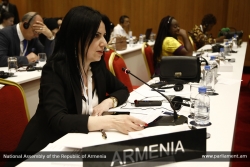Dear Women Parliamentarians,
Dear Colleagues,
Firstly, I am delighted to be part of the IPU Forum of Women Parliamentarians as a newly elected member of the Armenian Parliament and I do hope to contribute to the work of this important platform.
As you might be aware, in the spring of 2018, the Armenian people exercised their unbreakable power through peaceful, non-violent revolution. We, Armenians, love to call it the Armenian Velvet Revolution or the Armenian way of doing revolutions.
In December 2018, we held snap parliamentary elections, which were recognized by all prominent international organizations, local observers, as well as political contestants as unprecedented, the freest, the fairest, the most transparent and democratic elections we have ever had in our country.
The new Parliament convened for the first time in January 2019.
Before addressing equality issues at workplace, I wish to inform you that Armenian women were key to our success in the peaceful change. It is an absolute fact that thousands of Armenian women, marching in the streets for around 40 days, were protesting not only for the change in the government, but also for their rights in a traditionally patriarchal society.
After the political change, we have more qualified women positioned for leadership roles in the public sector: increased number of women MPs, first female mayor, and a number of female deputy governors and heads of agencies.
Dear Colleagues,
There is a common understanding that men and women should have equal access to university education, however when it comes to employment, equal access is compromised. Women constitute more than a half of Armenian population and the percentage of educated women is higher than that of men. Despite this fact, the data show that women are holding mostly lower positions. Over the years, women working in the public sector, represented a greater number than men, but they mostly did not hold decision-making positions. Moreover, in women’s case, the unemployment rate is higher.
Workplace discrimination against pregnant female employees with family responsibilities takes many forms and represents a violation of labor rights. The lack of maternity leave or guaranteed job retention forces many women to choose between working and giving birth, in other words between their productive and reproductive roles.
Colleagues,
What kind of solution we can advocate in our parliaments? Flexible working hours, availability of part-time work, provisions for maternity and paternity leave; all these have positive effects on women’s labor-force participation. In addition to this, in my opinion, our work should primarily target a change in the mindset through education, awareness raising and advocacy, aiming at empowering women to step out of the shadow and exercise their rights, including the right of participation in politics in greater numbers.
Thank you for your attention!
